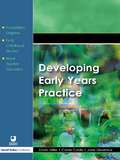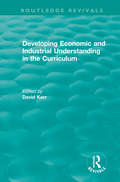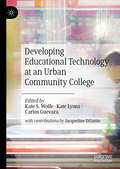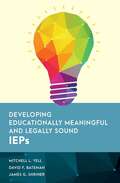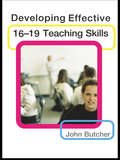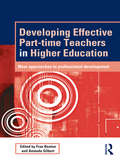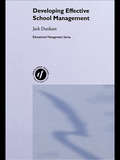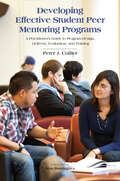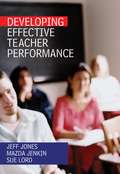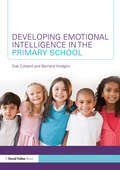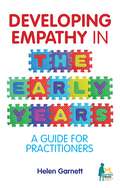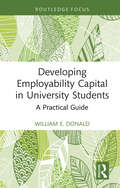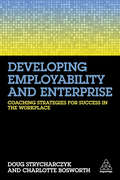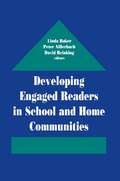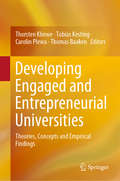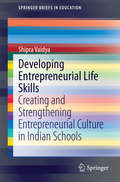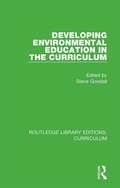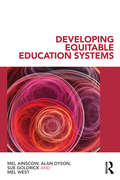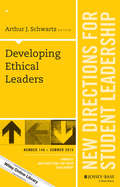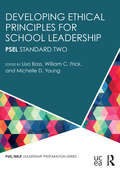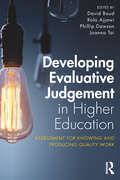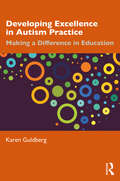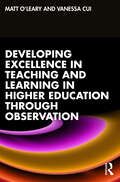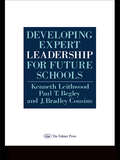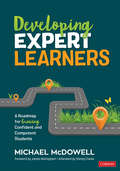- Table View
- List View
Developing Early Years Practice
by Linda Miller Carrie Cable Jane DevereuxThis book provides readers working in a diverse range of early years settings with the underpinning knowledge required to increase their effectiveness in working with young children. It will explore a wide range of issues including: the roles and responsibilities of practitioners; developing reflective practice; how children learn and develop; earl
Developing Economic and Industrial Understanding in the Curriculum (Routledge Revivals)
by David KerrPublished in 1994. Integrating cross-curricular themes into the curriculum has emerged as a major challenge for all schools. What is their relevance to the specialist subject teacher? How can the hard-pressed teacher ensure their coverage through the statutory programmes of study and statements of attainment? How does a school ensure that each pupil's experience makes sense – across the curriculum, at any one time, and in the course of time? How can a school link with partners in the local community to enhance cross-curricular work? This challenge remains as National Curriculum content and procedures are streamlined. Primary and secondary school teachers will find here a book filled with practical suggestions from a wide range of subject-specialist viewpoints. These highlight opportunities for developing economic and industrial understanding (EIU) and economic awareness through work in the other cross-curricular areas, through the National Curriculum core and foundation subjects and through other areas of study. Whatever the shape of the National Curriculum in years to come, this book and its companion volumes provide – for heads and deputies, teachers engaged in curriculum coordination and delivery, school inspectors, advisers, initial teacher trainers, INSET providers and those in the community – a wealth of ideas to embed cross-curricular issues into the whole school and its curriculum.
Developing Educational Technology at an Urban Community College
by Jacqueline DiSantoThis book uses a mix of personal narratives, anecdotal evidence, and research-based findings to tell the story of a small, urban community college’s efforts to develop and nurture a Community of Practice (CoP) that would galvanize the campus’ adoption of Educational Technology. Located in one of the poorest congressional district in the United States, Hostos Community College, a Hispanic-serving institution and part of the City University of New York (CUNY), has a unique history rooted in activism, advocacy, and community outreach, and has built a reputation for technology innovation. This book is a collection of writing from faculty and staff members whose decades of experience integrating technology into the classroom pre-dates many of the official initiatives now in place at CUNY.
Developing Educationally Meaningful and Legally Sound IEPs
by Mitchell L. Yell David F. Bateman James G. ShrinerThe purpose of this book is to assist readers to use better practices when developing educationally meaningful and legally sound Individualized Education Programs (IEPs). Beginning with the history and purpose of IEPs, this book examines the context and reasons IEPs were first created. The core chapters address better practices in conducting assessments, developing present levels of academic achievement and functional performance statements, crafting measurable annual goals, determining special education services, and monitoring and reporting on students’ progress. The authors also discuss placing students with disabilities in the least restrictive environment (LRE) and provide forms and graphics to assist in developing students’ special education programs.
Developing Effective 16-19 Teaching Skills
by John ButcherDeveloping Effective 16-19 Teaching Skills aims to enhance the competence of student- teachers in secondary schools and FE college as they confront sixteen to nineteen teaching for the first time. Based around the new standards set out in Qualifying to Teach and the Fento standards, the book will help student- teachers address the different teaching strategies needed to teach post-sixteen students. The book will also appeal to practising teachers who are looking for a fresh perspective.Full of case studies and questions for reflection, this comprehensive textbook includes chapters on: sixteen to nineteen teaching contextualized effectiveness defined avoiding preconceptions sixteen to nineteen: planning for differentiation subject expertise assessment sixteen to nineteen active learning in the sixteen to nineteen classroom the importance of the tutor role in sixteen to nineteen teaching learning with colleagues: developing a career in sixteen to nineteen teaching. Emphasizing the minimal attention given to sixteen to nineteen teaching in the Standards for Secondary QTS, the book is organized to prompt trainee teachers to draw more fully on sixteen to nineteen evidence and enhance their competence and confidence in teaching that phase. Trainee college teachers are also given a route to meeting the FENTO standards.
Developing Effective Part-time Teachers in Higher Education: New Approaches to Professional Development (SEDA Series)
by Fran Beaton Amanda GilbertPart-time teachers have become an increasing part of the workforce in universities throughout the world. They work in a sector undergoing enormous change and debate about the purposes of the university for individuals, societies and economies. As part-time employees, however, they are not necessarily offered the same level of support or recognition as full-time lecturers. This book, drawing on the voices of part-time teachers and the expertise of those who support them, considers whole-institution strategies to promote individual and collective professional development. Utilising real action research undertaken by expert practitioners from Australia, New Zealand and the UK, this book explains: What motivates part-time teachers; Developing effective policy and practice to support part-time teachers; What part-time teachers’ voices tell us about the content and delivery of induction programmes and ongoing support; The implications of change and future directions of Higher Education and part-time educators; How to build sustainable frameworks for the professional development of part-time staff. Developing Effective Part-time Teachers in Higher Education explores the extent to which part-time staff are utilised, the effectiveness of their teaching, their integration into the broader teaching environment, and their training and development. This international text will prove an invaluable source for anyone involved in academic and educational staff development in Higher or Further Education, and is essential reading for Human Resources directors and managers, senior academics and all part-time teachers.
Developing Effective School Management
by Jack DunhamFirst Published in 2004. Routledge is an imprint of Taylor & Francis, an informa company.
Developing Effective Student Peer Mentoring Programs: A Practitioner's Guide to Program Design, Delivery, Evaluation, and Training
by Peter J. CollierAt a time when college completion is a major issue, and there is particular concern about the retention of underserved student populations, peer mentoring programs offer one solution to promoting student success. This is a comprehensive resource for creating, refining and sustaining effective student peer mentoring programs. While providing a blueprint for successfully designing programs for a wide range of audiences – from freshmen to doctoral students – it also offers specific guidance on developing programs targeting three large groups of under-served students: first-generation students, international students and student veterans.This guidebook is divided into two main sections. The opening section begins by reviewing the issue of degree non-completion, as well as college adjustment challenges that all students and those in each of the targeted groups face. Subsequent chapters in section one explore models of traditional and non-traditional student transition, persistence and belonging, address what peer mentoring can realistically achieve, and present a rubric for categorizing college student peer-mentoring programs. The final chapter in section one provides a detailed framework for assessing students’ adjustment issues to determine which ones peer mentoring programs can appropriately address. Section two of the guidebook shifts from the theoretical to the practical by covering the nuts and bolts of developing a college student peer-mentoring program. The initial chapter in section two covers a range of design issues including establishing a program timeline, developing a budget, securing funding, getting commitments from stakeholders, hiring staff, recruiting mentors and mentees, and developing policies and procedures. Subsequent chapters analyze the strengths and limitations of different program delivery options, from paired and group face-to-face mentoring to their e-mentoring equivalents; offer guidance on the creation of program content and resources for mentors and mentees, and provide mentor training exercises and curricular guidelines. Section two concludes by outlining processes for evaluating programs, including setting goals, collecting appropriate data, and methods of analysis; and by offering advice on sustaining and institutionalizing programs. Each chapter opens with a case study illustrating its principal points. This book is primarily intended as a resource for student affairs professionals and program coordinators who are developing new peer-mentoring programs or considering refining existing ones. It may also serve as a text in courses designed to train future peer mentors and leaders.
Developing Effective Teacher Performance
by Jeff Jones Mazda Jenkin Sue DaleImproving and maintaining staff performance is an important and often difficult responsibility for school leaders and senior teachers. Offering guidance on diagnosing ineffectiveness, supporting ineffective teachers, and procedures when support isn′t enough, this practical book is designed to help those teachers who manage others. It will help the reader to understand what under-performance is, and to develop a whole school approach to monitoring, supporting and restoring teacher performance. There is also advice on self-help and development for the teachers themselves. This is an essential one-stop reference text for every senior teacher in primary and secondary schools.
Developing Emotional Intelligence in the Primary School
by Sue Colverd Bernard HodgkinDo you want to promote sociability and positive behaviour in your classroom? Is having an ‘emotionally intelligent classroom’ one of your teaching goals? Are you looking for ways to teach the curriculum more ‘creatively’? Developing Emotional Intelligence in the Primary School is an essential text for supporting children’s emotional preparation for learning in the long term, fostering the development both of self belief and permanent and crucial resilience. This book allows teachers to review their practice and approach to teaching and to re-assess how they view their pupils. Using practical drama frames that the teacher can develop for themselves, it gives a background and framework to build emotional intelligence in a child and generate a culture of openness to learning in the classroom. Areas covered include: Self-esteem, emotional and social intelligence; Independence and self-reliance; Creating an emotionally intelligent learning environment; Emotional literacy based around core curriculum areas including literacy and history; Conflict resolution and anti-bullying strategies; Building emotonal resilience in vulnerable children; Using and integrating positional drama for Emotional Intelligence. With a number of practical techniques and activities to be implemented in the classroom, this introduction to emotional intelligence will be of great interest to all primary school teachers looking to further understanding of pupils social and emotional development through learning.
Developing Empathy in the Early Years: A Guide for Practitioners
by Helen Garnett Helen Lumgair Jackie Harland Valerie LovegreenEmpathy is an essential part of being human: it allows us to connect with others, which in turn opens doors for us to happiness and success. Though everyone is born with an inherent capacity for empathy, children have the power to grow and re-build their natural supply, and even 'learn' to be more understanding towards others. This pithy and practical guide provides early years professionals with the tools to make empathy the foundation for their work. It reveals where the roots of empathy lie, how to prioritise it in practice, and how it manifests itself in young developing brains. It includes simple teaching strategies and creative ideas for empathy-building games and activities, enabling you to help children grow up as happier, friendlier, more thoughtful individuals. This book is an essential resource for anyone working with small children.
Developing Employability Capital in University Students: A Practical Guide
by William E. DonaldThis comprehensive guide introduces and operationalises the Employability Capital Growth Model (ECGM), offering an innovative tool for career development practitioners and academics to prepare university students for a volatile, uncertain, complex, and ambiguous labour market.By adopting a holistic view of graduate employability complemented by Sustainable Career Ecosystem Theory, this book offers interdisciplinary insights from applied psychology, career development, higher education, human resource management, and sociology. The book is divided into four parts: Part I begins with the theoretical foundations of a sustainable career ecosystem and the development of the ECGM. Part II offers an in-depth exploration of the ECGM, incorporating nine forms of capital, contextual and temporal factors, and personal outcomes. Part III presents a 10-step guide to using the ECGM with university students, informed by 19 cases from 26 career development practitioners and academics from across 16 countries and 6 continents. Part IV encourages readers to consider the implications for other actors within a sustainable career ecosystem and concludes with a summary of the key takeaways for each chapter. Whether used in one-to-one sessions, group workshops, or as part of university curricula, this book makes the ECGM accessible and easily applicable for anyone seeking innovative strategies to support university students in achieving sustainable and fulfilling careers.
Developing Employability and Enterprise: Coaching Strategies for Success in the Workplace
by Doug Strycharczyk Charlotte BosworthDeveloping Employability and Enterprise shows how to help others develop the behaviours and attributes needed to thrive in the modern workplace. It offers coaches, career advisors and educators a complete guide to what employability looks like in the 21st century, both for new entrants to the world of work and those finding themselves in situations where they need to secure a new job or even career. The book shows how employability can be measured and how skills and attributes such as resilience, confidence, motivation, dealing with others, overcoming challenges and entrepreneurship can be developed through coaching and mentoring. Supported by the latest research from academia, government bodies, and practitioners, Developing Employability and Enterprise brings together some of the most influential thinkers around the world to offer a new approach to career management that looks beyond simply offering advice on résumés and CVs, job applications, job searches and interviews. It offers practical guidance on what attributes to develop and tools for how to do this including assessment options, sample exercises, notes on how to use the concepts in practice and global case studies.
Developing Engaged Readers in School and Home Communities
by Peter Afflerbach David Reinking Linda BakerThis book comprises a synthesis of current directions in reading research, theory, and practice unified by what has been referred to as the engagement perspective of reading. This perspective guides the research agenda of the National Reading Research Center (NRRC), a consortium of the University of Georgia, University of Maryland, and affiliated scholars. A major goal of the book is to introduce reading researchers to the engagement perspective as defined by the NRRC and to illustrate its potential to integrate the cognitive, social, and motivational dimensions of reading and reading instruction. Engaged readers are viewed as motivated, strategic, knowledgeable, and socially interactive. They read widely for a variety of purposes and capitalize on situations having potential to extend literacy. The book is organized into four sections representing key components of the NRRC research agenda and the engagement perspective. This perspective emphasizes contexts that influence engaged reading. Accordingly, the first section of the volume focuses on the social and cultural contexts of literacy development, with chapters devoted to examining home influences, home-school connections, and the special challenges facing ethnic minorities. The engagement perspective also implies greater attention to the role of motivational and affective dimensions in reading development than traditional views of reading. Therefore, the second section examines motivational theory and its implications for reading engagement, with special attention to characteristics of classroom contexts that promote motivation in reading. The engagement perspective embraces innovative instructional contexts that address the cognitive, social, and motivational aspects of reading. Thus, the third section includes chapters on current directions in promoting children's learning from text, on the value of an integrated curriculum in promoting reading engagement, and on the challenges of assessing students' development as engaged readers. Finally, the broader conception of reading implied by the engagement perspective requires an expanded array of research approaches, sensitive to the complex and interacting contexts in which children develop literacy. The concluding section focuses on these important contemporary issues in literacy research and educational research, with chapters examining the variety of alternative modes of inquiry gaining prominence in literacy research, teacher inquiry, and ethical issues of collaboration between university and teacher researchers. Intended for university-based researchers, graduate students, and classroom teachers, this volume brings together researchers who think about students and their literacy development in school and home communities in distinctly different ways. The cooperative and collaborative inquiry presented contributes to a richer understanding of the many factors influencing engaged reading.
Developing Engaged and Entrepreneurial Universities: Theories, Concepts and Empirical Findings
by Carolin Plewa Thorsten Kliewe Tobias Kesting Thomas BaakenThis book investigates key aspects of the development of engaged and entrepreneurial universities. Reflecting the complex and dynamic nature of changes in higher education institutions (HEIs), multi-level perspectives in the field are taken into account, namely the ecosystem, relationship, organisational and individual perspective. The book highlights the entrepreneurial and the social orientation of HEIs by focusing on both primary economically focused (entrepreneurial) universities and primary socially focused (engaged) universities. It challenges the understanding of the role universities and its individual stakeholders play today. The book explores a multitude of facets and perspectives on the topic and addresses both what we already know and what knowledge still needs to be acquired.
Developing Entrepreneurial Life Skills
by Shipra VaidyaThis book presents an epistemological framework for integrating entrepreneurship education across the general school curriculum. It also explores how such education can be inclusive and integral to the objective, content, pedagogy and assessment practices for different stages of school education in general and the elementary stage in particular. It takes on board the development of entrepreneurial proficiencies through the use of narratives, arts and craft, work and life skills and home-community partnership. The precise aims of the book are to: (a) conceptualize entrepreneurship education in different stages of school education as an objective, an approach and as a specific subject; (b) promote the culture of entrepreneurship in the school system; (c) establish a methodology within which effective teaching-learning can be developed with respect to the extent to which entrepreneurial learning is considered to be an extracurricular activity or as an intrinsic part of school education; (d) integrate entrepreneurship education at the elementary stage, and its progression further on; and (e) identify behavioural outcomes validating entrepreneurship development in school education.
Developing Environmental Education in the Curriculum (Routledge Library Editions: Curriculum #8)
by Steve GoodallOriginally published in 1994. This work is intended for teachers in primary and secondary schools faced with the challenge of maximizing National Curriculum opportunities for environmental or "green" issues. The contributors suggest ways of augmenting pupils' understanding of the issues. This book is for teachers in primary and secondary schools faced with the challenge of maximising curriculum opportunities for environmental issues. Specialist contributors suggest practical ways of augmenting their pupils’ understanding of these issues, via work in the other cross-curricular areas, in core and foundation subjects of the National Curriculum and in other areas of study.
Developing Equitable Education Systems
by Mel West Mel Ainscow Alan Dyson Sue GoldrickDespite consistent improvements in the school systems of over recent years, there are still too many children who miss out. It is not only children from disadvantaged backgrounds attending hard-pressed urban schools that the system is failing - even in the most successful schools there are often groups of learners whose experience of schooling is less than equitable. As a result of their close involvement with a group of schools serving a predominantly working-class community over five years, the authors of this book offer an analysis of how marginalisation within schools can arise, and provide suggestions for responding to this crucial policy agenda. They propose a teacher-led inquiry strategy that has proved to be effective in moving forward thinking and practice within individual schools. However, their research has shown that using the same strategy for system change is problematic within a policy context that emphasises competition and choice. Learning from this experience, the authors analyse the factors that inhibit the collaborative approach needed to reduce inequities that exist between the schools, in order to formulate proposals that can move the system as a whole towards more equitable provision. In Developing Equitable Education Systems, the authors focus on the way teachers’ sense of ‘fairness’ can become a powerful starting point, helping individual schools to inquire into and develop their own practice and provision. They provide practical suggestions for practitioners about ways of working that can create a greater sense of equity within particular school contexts, and highlight the barriers to a wider strategy for reducing system inequities that reside in local and national policies and traditions. At a time when government policies in many countries move to extend the diversity of educational provision - for example, through the introduction of charter schools in the USA, free schools in Sweden and academies in England - the authors also include a set of recommendations that offer a timely warning against the fragmentation of school systems in the misguided belief that competition benefits all children. They suggest that a more sensible approach would be to avoid situations whereby the improvement of one school leads to a decline in the resources available to, and subsequently the performance of, others.
Developing Ethical Leaders: New Directions for Student Leadership, Number 146 (J-B SL Single Issue Student Leadership)
by Arthur J. SchwartzThe call for our schools and universities to develop ethical leaders has never been stronger. This volume offers new approaches to equipping our student leaders with the skills, competencies, and courage to act in an ethical manner, even in the face of peer pressure, tradition, or convention. Each chapter includes: Ideas and strategies to help student leaders become more ethically fit Ways to challenge students to pursue what is ethical and right rather than simply avoiding what is wrong or illegal Examples of words, phrases, and red flag situations, along with effective responses, that can be practiced and taught Six different leadership models to help understand the dynamics and potentials of ethics-related leadership The Jossey-Bass quarterly report series New Directions for Student Leadership explores leadership concepts and pedagogical topics of interest to high school and college leadership educators. Issues are grounded in scholarship and feature practical applications and best practices in youth and adult leadership education.
Developing Ethical Principles for School Leadership: PSEL Standard Two (PSEL/NELP Leadership Preparation)
by Michelle D. Young Lisa Bass William C. FrickCo-published with UCEA, this new textbook tackles Standard #2 of the Professional Standards for Educational Leaders (PSEL)—Ethics and Professional Norms. This volume includes specific strategies for school leaders to develop knowledge and skills in supporting the learning and development of all students, as well as understanding the dynamics and importance of ethics in leadership practice. By presenting problem-posing cases, theoretical grounding, relevant research, implications for practice, and learning activities, this book provides aspiring leaders with the background, learning experiences, and analytical tools to successfully promote ethical leadership and student success in their contexts. Special features include: • Case Studies—provide an opportunity to practice ethical reasoning and engage in the discussion of complexities and debates within each case. • Learning Activites—a range of exercises help readers make connections to the PSEL standard. • Important Resources—includes resources that support and encourage students to explore each of the chapter’s elements.
Developing Evaluative Judgement in Higher Education: Assessment for Knowing and Producing Quality Work
by David Boud, Rola Ajjawi, Phillip Dawson and Joanna TaiA key skill to be mastered by graduates today is the ability to assess the quality of their own work, and the work of others. This book demonstrates how the higher education system might move away from a culture of unhelpful grades and rigid marking schemes, to focus instead on forms of feedback and assessment that develop the critical skills of its students. Tracing the historical and sociocultural development of evaluative judgement, and bringing together evidence and practice design from a range of disciplines, this book demystifies the concept of evaluative judgement and shows how it might be integrated and encouraged in a range of pedagogical contexts. Contributors develop various understandings of this often poorly understood concept and draw on their experience to showcase a toolbox of strategies including peer learning, self-regulated learning, self-assessment and the use of technologies. A key text for those working with students in the higher education system, Developing Evaluative Judgement in Higher Education will give readers the knowledge and confidence required to promote these much-needed skills when working with individual students and groups.
Developing Excellence in Autism Practice: Making a Difference in Education
by Karen GuldbergThis ground-breaking book gives an accessible overview and synthesis of current knowledge of relevance to the development of excellence in autism education. By situating understandings of autism within a ‘bio-psycho-social-insider’ framework, the book offers fresh insights and new ways of thinking that bring together global pedagogic practice, research, policy, and the insider perspective. Guldberg critiques current notions of Evidence-Based Practice and suggests ways of bridging the research-practice gap. She explores the interrelationship between inclusive principles, distinctive group learning needs and the individual needs of the child or young person. Eight principles of good autism practice provide a helpful framework for how education settings and practitioners can adapt classroom environments and teaching so that autistic children and young people can thrive. Written for anyone who wants to make a difference to the lives of autistic pupils, Developing Excellence in Autism Practice provides practitioners and students on education courses with tools for best practices, and shows how to draw on these to implement true positive change in the classroom.
Developing Excellence in Teaching and Learning in Higher Education through Observation
by Matt O'Leary Vanessa CuiOffering interdisciplinary, evidence-informed discussion and practical resources for using observation as a tool of educational inquiry to enhance understanding and the quality of teaching and learning in higher education, this book draws on forward-thinking, contemporary research. Illustrated with real examples and case studies of collaborative observation from a range of subject areas, it provides a conceptual and practical guide for harnessing observation to better understand the relationship between teaching and learning. This is a must-read book for all those interested and involved in using observation to understand, develop and improve the quality of teaching and learning in higher education. .
Developing Expert Leadership For Future Schools
by Kenneth Leithwood J. Bradley Cousins Paul T. BegleyBased on the authors' research on the behaviour and thinking of school leaders, this volume presents arguments about the natue of expert school leadership. It parallels developments in the field from the early 1980s when the emphasis was on identifying the behaviours of effective principals, to the early 1990s, when the focus shifted to understanding the thinking underlying those behaviours. The ideas contained in this book should be useful in helping practising educationalists develop the skills involved in school leadership.
Developing Expert Learners: A Roadmap for Growing Confident and Competent Students (Corwin Teaching Essentials)
by Michael McDowellFinally— a roadmap for growing students’ confidence and competence in learning. We strive to empower our students to lead their own inquiry, discover knowledge, and construct approaches to solving real-life challenges. Often, though, we make the mistake of designing learning experiences that burden students with the unrealistic expectation of expertise that hasn’t yet been developed. The solution: proper scaffolding for surface, deep, and transfer learning. Building upon the groundwork from Michael McDowell’s book Rigorous PBL by Design, this new resource provides practices that strategically support students as they move from novices to experts in core academics. You’ll learn high-impact strategies that ensure students develop ownership and confidence in their learning, plus essential tools to build your own efficacy and support your colleagues in building collective expertise. Chock full of mission-critical guidance, this book Provides an actionable framework for developing student expertise Offers practical strategies, tools, and routines for creating a culture that cultivates expertise and builds student efficacy Gives a simple, effective unit and lesson template that clarifies the steps students must take to build, deepen, and apply core content knowledge and skills Ensures your students’ progress in their learning through a process for selecting instructional, feedback, and learning strategies Includes strategies for improving your professional expertise individually and collectively "As educators, we are challenged to prepare our students for college and career readiness as they go into the real world. Developing Expert Learners addresses the intentional moves of the teacher to prepare students for challenging work at their level of learning, resulting in students reaching their fullest potential as experts in their own learning." Elizabeth Alvarez, Chief of Schools Chicago Public Schools
